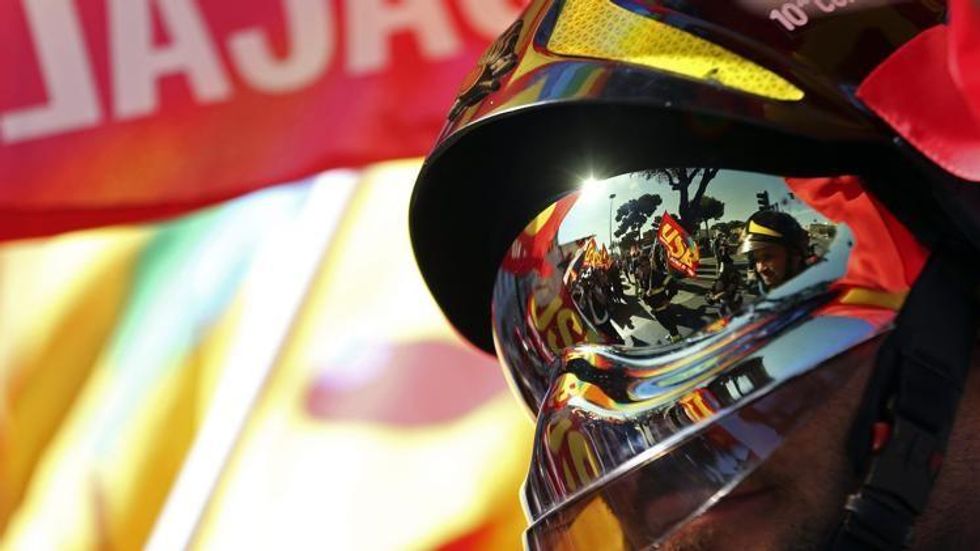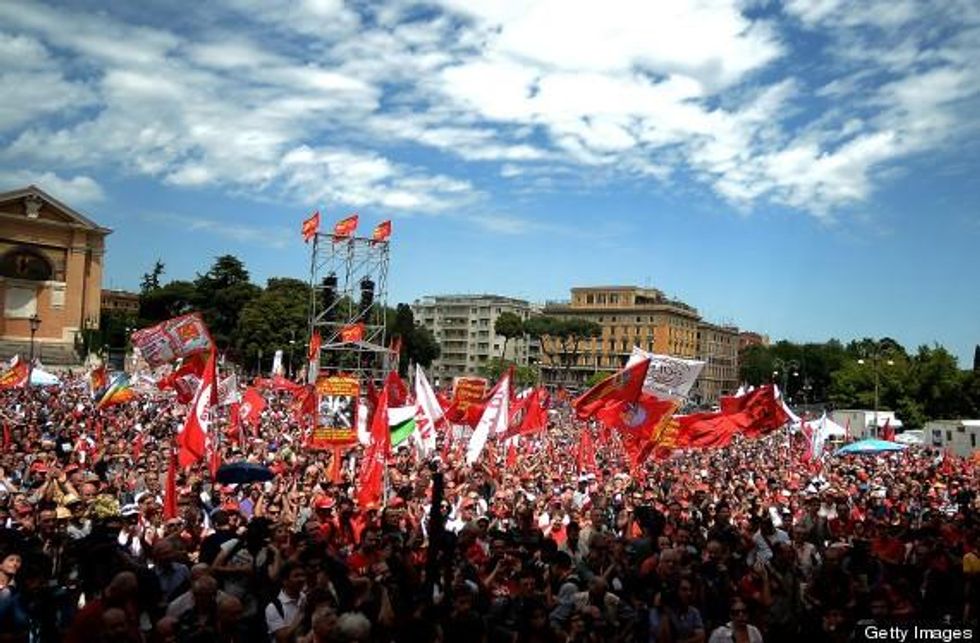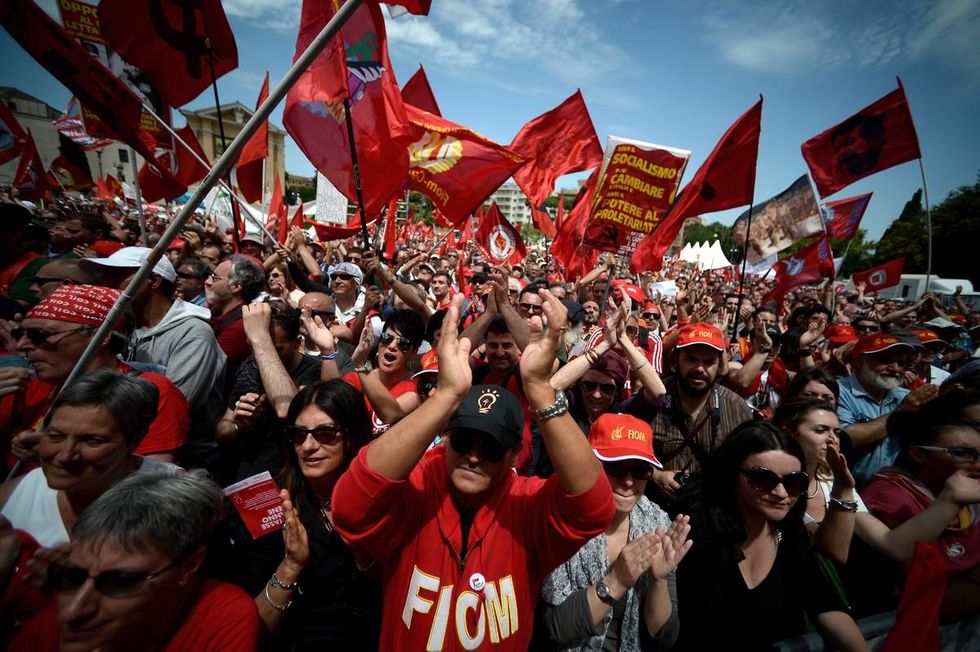

SUBSCRIBE TO OUR FREE NEWSLETTER
Daily news & progressive opinion—funded by the people, not the corporations—delivered straight to your inbox.
5
#000000
#FFFFFF
To donate by check, phone, or other method, see our More Ways to Give page.


Daily news & progressive opinion—funded by the people, not the corporations—delivered straight to your inbox.
They’re usually worse off during their subsequent terms in office. So are the rest of us.
On November 5, Donald Trump was elected as the 47th U.S. president. Trump is an oligarch—an economic or political actor who secures and reproduces power and wealth, then transforms one into the other. And now he is in the small minority of oligarchs across history who have had second acts—having lost power or wealth, they find a way back. What can we learn from those experiences that might inform our understanding of Trump’s second term?
To answer that question, we looked at the track records of three other business oligarchs like Trump who have served as heads of state or government since World War II. Business oligarchs begin their journey by accumulating wealth, then move to power.
In our book The Oligarch’s Grip: Fusing Wealth and Power, we wrote about Chilean president Sebastian Piñera. He served two non-consecutive terms in office (2010-14 and 2018-22). His second act was decidedly worse than his first. During his first term in office, per capita income in constant dollars grew by 14%, while life expectancy expanded by 0.9 years. Sure, there were controversies, such as the appointment of Pinochet-era figures as cabinet ministers and protests over the end of the school voucher system. But, in general, Chileans felt better off.
While we are hesitant to make any grand predictions for the Trump second term based on these cases, it does seem questionable that it will be any better than the first.
By contrast, Piñera’s second term was disastrous. Per capita income rose by only 2% and life expectancy contracted by 0.8 years. The Covid-19 pandemic played a role in these outcomes, but it wasn’t the only driver. Piñera’s poor handling of a second, larger set of student protests has also led to his relatively low ranking among modern Chilean heads of state. He died in a helicopter accident in 2024.
Trump has been compared to Silvio Berlusconi, Italy’s three-time prime minister (1994-95, 2001-06, and 2008-11). We will focus on his second and third terms, which are longer. Per capita income expanded by 3.5% in that second term, and life expectancy grew by a remarkable 1.4 years. Ambitious goals aimed at constitutional and tax reform were thwarted, but, still, Italians felt better off, even if they narrowly backed a center-left coalition that removed Berlusconi from office.
His third term was dominated by the 2007-08 global financial crisis, the Great Recession of 2008-09, and the 2009-10 eurozone crisis. Italy’s economy was one of the most highly indebted in Europe, and higher interest rates led to a 6.8% GDP decline during 2008-09. Per capita income declined by 3.6% during this term, while life expectancy increased by 0.6 years. Having been ranked by Forbes as the 12th most powerful person in the world in 2009, Berlusconi resigned in 2011 as a deeply unpopular and polarizing figure.
A similar pattern of a poor second act emerges with Rafic Hariri, Lebanon’s prime minister for two terms (1992-98 and 2000-04). Per capita income grew by a substantial 44% during his first term, while life expectancy expanded in the post-civil war period by 2.2 years. But when Hariri returned to office for a second term, results were much less compelling: income up by 16% and life expectancy by 0.6 years. Political tensions led to his assassination in 2005. His son Saad served two terms as well and also left office under a cloud. A third oligarch prime minister, Naguib Mikati, is in his third term and, given the recent Israeli invasion, is unlikely to have a successful ending.
Does history offer any relief from this picture of disappointing second acts? Not really. For example, Marcus Licinius Crassus—one of the Roman Republic’s richest and most powerful men, served as consul twice (70 and 55 BCE), both times with often rival and sometimes ally Pompey. The first consulship led to the Triumvirate Alliance of Caesar, Pompey, and Crassus. The second consulship led to Crassus being named governor of the endlessly wealthy province of Syria, where he was defeated by the Parthians and died in 53 BCE.
These examples suggest some preliminary findings and cautions. First, oligarchs’ second acts generally end badly. Sometimes, external circumstances drive this result. Other times, it seems that oligarchs don’t show much evidence of learning from their first terms.
Second, many oligarchs never serve in decision-making roles as heads of state or government like Piñera, Berlusconi, or Hariri. Some have agenda-setting power through political contributions or media ownership. Others have ideological power, shaping the way we think and act. Based on our dataset at the Center for the Study of Oligarchs, we are unaware of any oligarchs who had and lost those types of power who were able to regain it. We also don’t know of any significant cases of oligarchs losing their wealth and then recovering it.
While we are hesitant to make any grand predictions for the Trump second term based on these cases, it does seem questionable that it will be any better than the first. During that first term, per capita in the U.S. rose by 2.9% and life expectancy fell by a jaw-dropping 1.7 years. That record helped earn Trump a ranking as the worst president in U.S history, according to the American Political Science Association survey.
It is difficult to imagine how Trump will be able to successfully fight the dismal history of oligarchs’ second acts.
The victory of Giorgia Meloni's far-right coalition in Italy's election is yet the starkest evidence of the dramatic consequences that the neoliberal policies of the European Union (EU) are having on the member states. Indeed, the return of old demons in Italy and the spread of far-right movements and parties across Europe are directly linked to the reactionary economic dogmas and shallow integration strategies pursued by the euro masters in Brussels and Frankfurt.
Europe's multiparty systems make it difficult for any given party to gain clear majority support, thus political parties have to work in a coalition.
Let me explain.
Following the end of World War II, certain visionary leaders in France and Germany proceeded with the creation of structures and institutions beyond the nation-state to ensure that Europeans would finally put an end to their favorite pastime: bloody warfare. This was the logic behind the creation of the European Economic Community (EEC), which was founded by the Treaty of Rome in 1957. It was a rather noble undertaking, and one that managed to build solid alliances among historical enemies that have lasted longer than any other time in European history, although other factors, such as the Cold War, played a significant role in the long period of peace that ensued in Europe since the end of the Second World War.
However, the EEC evolved over time into something beyond a regional trade regime with respect for democracy, national sovereignty and social rights. It was transformed into a corporate entity driven by the relentless desire to subjugate labor to the whims of capital and to impose "economic efficiency" in the management of the welfare state through the gradual transfer of power from the demos to non-elected officials in Brussels. Ultimately, this vision was materialized with the Maastricht Treaty in 1992, the foundation treaty of the European Union. The Maastricht Treaty also paved the way for the creation of a single currency, but without putting into place a federal system of government.
In this sense, rather than being unique, the EU is in fact an oddity--a Frankenstein-like creation. With the adoption of a single currency, in particular, the space for national economic policymaking was severely constrained and, in the absence of a federal government, austerity became almost by default, an integral component of the new European political economy, providing a perfect match to labor flexibility and other anti-social reform measures--privatization, the commodification of health and education, pension reform--all of which are geared toward the marketization of society. Full employment, which prior to the creation of the EU political parties of all persuasion took seriously, was ditched in favor of flexible labor markets and equality was left to the "logic" of the market forces themselves.
The so-called "flawed" architecture of the EU was not due to oversight or technical errors. It stemmed from the very premises of the fundamental neoliberal dogmas that guided the mindset of the European economic elites and their corporate and financial allies. European policymakers had become obsessed with the belief that the critical variables for growth were to be found in trade openness and competition, deep financial integration, and the removal of all restrictions on capital movements. They understood very well that these were the conditions that would pave the way to more efficient business operations, lower unit labor costs, and increase profit margins for Europe's multinational corporations.
Indeed, the Europeanization process that has been unleashed since the signing of the Maastricht Treaty is completely alien to the traditional vision of a social and democratic Europe, creating in the process fertile soil for the growth of authoritarian leaders who promise to take power away from the global elites, re-establish the supremacy of the nation-state, and return to the traditional social order in which national homogeneity and family values reign supreme.
It is due to the unsettling effects of the EU's neoliberal policies that voters on the continent have shifted dramatically to the right, even in traditionally social democratic nations like Sweden and Finland, especially since the socialist and social-democratic parties have abandoned any pretext of caring about the working class and have in fact been carrying out the mission of a neoliberal EU.
The euro crisis of 2010 brought to surface all the structural weakness of the EU and intensified the realignment of European voters over both social and cultural issues, with conservative and outright reactionary political parties and movements gaining the upper hand virtually throughout the continent, with Greece being a rare exception. But even in the land that founded democracy, the experiment with a "leftist" government was short-lived after Syriza engaged in a gigantic betrayal of the clear mandate that it had to shred into pieces the bailout agreements and do away with EU's sadistic austerity measures.
The electoral victory of Brothers of Italy, led by Giorgia Meloni, a longtime admirer of fascist dictator Benito Mussolini, comes therefore as no surprise. It is the price representative democracies are paying for allowing themselves to be controlled by outside forces with little if any political legitimacy. Indeed, lest we forget, the signing of the Maastricht Treaty was one of the most undemocratic procedures in the history of modern Europe. It was signed by presidents and prime ministers without any popular input, let alone consent.
Make no mistake about it. It is the undemocratic nature and the neoliberal policies of the European Union that are responsible for the revival of European fascism. And it is not just in Italy that the far-right has come to power. In Spain, the far-right also holds a share of power. Moreover, today's conservatives in Europe have no objection working with the far-right in order to come to power. The cabinet of the current conservative government in Greece has scores of ministers who have had close ideological and political ties with the far-right.
Still, at the present historical juncture, the danger of European societies becoming fascist is far less than the one facing the United States. Europe's multiparty systems make it difficult for any given party to gain clear majority support, thus political parties have to work in a coalition. Giorgia Meloni's far-right Brothers of Italy won 26 percent of the vote, but both the anti-immigration League Party of Mateo Salvini and the right-wing Forza Italia party of former prime minister Silvio Berlusconi secured far less votes than they did in 2018. Italy's far-right coalition did secure a clear majority in parliament but with less than 44 percent of the popular vote.
In the light of this and given that Italy will remain a member of the EU and of the eurozone, one should not expect to see radical changes in the way the new government will conduct itself on both the domestic and international fronts. Meloni has already indicated that her government will rule for all Italians. In practical terms, what this means is that her government will seek to ingratiate itself with both the business class and average citizens. According to the joint program of the coalition partners, Meloni's government will reduce taxes for business, families, and the self-employed alike, and use a greater portion of the $200 billion euros that has been allotted to Italy by the EU's recovery plan in the wake of the Covid pandemic to support social programs. Unlike the far-right in the U.S., Europe's far-right parties favor certain aspects of the social state.
On the foreign policy front, Meloni's government will surely remain an obedient servant to EU rules and regulations, while making occasional noises about EU reform, will support NATO and its policies towards Ukraine, while backing initiatives for a peaceful solution to the conflict, but will most likely impose stricter border controls as immigration was a big component of Meloni's campaign.
Italy's far-right coalition has also said that it will fight against discrimination, including anti-Semitism, but will take a hard stance on Muslim fundamentalism.
There is nothing in the above policies that distinguishes Meloni's far-right government from the conservative governments in place today in other European countries.
Indeed, it's been rumored that outgoing prime minister Mario Draghi, who had also served as European Central Bank President, personally vouched for Giorgia Meloni to the euro masters. This is quite possible, and, in fact, it is highly unlikely that Italy's new prime minister will rock the boat. If she does, one of the coalition partners (most probably Silvio Berlusconi's Forzia Italia) will most likely walk away and her government will collapse.
In this regard, the celebrations on the part of the Trumpist camp in the U.S. for the election of Giorgia Meloni may prove to be premature. Italy's far-right government does represent a clear setback for social and political progress, but the neo-fascist vision that inspires today's GOP isn't about to take form or shape in Italy. Both domestic (bureaucracy, organized labor, left-wing parties) and external (EU) constraints will ensure that this doesn't happen.
Are we sure that such constraints exist in the "land of the free and the home of the brave" to prevent far-right extremism from destroying what is left of American democracy?

A twenty-four-hour strike accompanied large-scale protests in Italy on Friday, as transportation workers and angry citizens marched against the continued austerity policies found in the government's latest budget proposals.
Centered in Rome, where more than 20,000 estimated protesters gathered, the anti-austerity movement and union organizers say that increased cuts are stifling economic recovery and doing long-term damage to Italian workers and their families.
As Agence France-Presse reports:
Thousands of people protested against economic austerity in Rome Friday as partial transport strikes across the country cancelled dozens of flights and snarled buses and trains.
Italy is struggling to shake off a two-year recession that has pushed unemployment to record highs and parliament is discussing a draft budget for next year that includes more cuts.
"We're giving money to the bankers! We're like a car going down a cliff," Paolo Ferrero, leader of the Communist Refoundation party, said at a demonstration by the USB union association in Rome.
Firefighters, steel workers, civil servants and students were among a few thousand people who took part in the protest march through central Rome.

And Euronews adds:
As part of the protest, a transport strike was called in the city. It hit trains, buses and Rome's airport, forcing easyJet to cancel 56 flights.
One protester told euronews: "I'm here to protest because it's always the same people paying for the crisis, always the workers. It has been happening for many, many years. Centre right, centre left. All the measures, liberal or social democratic, have all been unsuccessful."
The hostile domestic reaction to Italy's budget may pose a new threat to the stability of Enrico Letta's government, just weeks after the prime minister defeated Silvio Berlusconi's attempt to topple him.
A further general anti-austerity protest is expected on Saturday in Rome.
